- Home
- Fyodor Dostoyevsky
Netochka Nezvanova (Penguin ed.)
Netochka Nezvanova (Penguin ed.) Read online
NETOCHKA NEZVANOVA
FYODOR MIKHAILOVICH DOSTOYEVSKY was born in Moscow in 1821, the second of a physician’s seven children. When he left his private boarding school in Moscow he studied from 1838 to 1843 at the Military Engineering College in St Petersburg, graduating with officer’s rank. His first story to be published, ‘Poor Folk’ (1846), was a great success. In 1849 he was arrested and sentenced to death for participating in the ‘Petrashevsky circle’; he was reprieved at the last moment but sentenced to penal servitude, and until 1854 he lived in a convict prison at Omsk, Siberia. Out of this experience he wrote The House of the Dead (1860). In 1861 he began the review Vremya (Time) with his brother; in 1862 and 1863 he went abroad, where he strengthened his anti-European outlook, met Mlle Suslova, who was the model for many of his heroines, and gave way to his passion for gambling. In the following years he fell deeply in debt, but in 1867 he married Anna Grigoryevna Snitkina (his second wife), who helped to rescue him from his financial morass. They lived abroad for four years, then in 1873 he was invited to edit Grazhdanin (The Citizen), to which he contributed his Diary of a Writer. From 1876 the latter was issued separately and had a large circulation. In 1880 he delivered his famous address at the unveiling of Pushkin’s memorial in Moscow; he died six months later in 1881. Most of his important works were written after 1864: Notes from Underground (1864), Crime and Punishment (1865–6), The Gambler (1866), The Idiot (1869), The Devils (1871) and The Brothers Karamazov (1880).
JANE KENTISH was born in 1953 and took a B.A. in Russian Literature in 1974 at the University of Sussex, where two years later she gained her M.A. in Byzantine and Russian Art and Architecture. Since then she has worked as a researcher. She gives occasional lectures in Byzantine History and Art and has published various articles on Far and Middle Eastern art. Her translation of Tolstoy’s A Confession and Other Religious Writings is also published in the Penguin Classics.
Contents
About the Author
Title Page
Copyright
Translator's Introduction
Chapter One
Chapter Two
Chapter Three
Chapter Four
Chapter Five
Chapter Six
Chapter Seven
FYODOR DOSTOYEVSKY
NETOCHKA NEZVANOVA
TRANSLATED WITH AN INTRODUCTION BY JANE KENTISH
PENGUIN BOOKS
PENGUIN BOOKS
Published by the Penguin Group
Penguin Books Ltd, 27 Wrights Lane, London W8 5TZ, England
Penguin Putnam Inc., 375 Hudson Street, New York, New York 10014, USA
Penguin Books Australia Ltd, Ringwood, Victoria, Australia
Penguin Books Canada Ltd, 10 Alcorn Avenue, Toronto, Ontario, Canada M4V 3B2
Penguin Books (NZ) Ltd, Private Bag 102902, NSMC, Auckland, New Zealand
Penguin Books Ltd, Registered Offices: Harmondsworth, Middlesex, England
This translation first published 1985
19
Copyright © Jane Kentish, 1985
All rights reserved
Except in the United States of America, this book is sold subject to the condition that it shall not, by way of trade or otherwise, be lent, re-sold, hired out, or otherwise circulated without the publisher’s prior consent in any form of binding or cover other than that in which it is published and without a similar condition including this condition being imposed on the subsequent purchaser
ISBN:978-0-14-193629-1
TRANSLATOR’S INTRODUCTION
Netochka Nezvanova, which can be loosely translated as ‘nameless nobody’, was Dostoyevsky’s first attempt at writing a novel. The idea is first aired in the year 1846 in a letter written to his brother where he says that he intends to write a ‘big novel’ in the form of a ‘confession’. It seems that he hoped to finish the work by the end of the following year, but the design of the novel was so ambitious and conceived on such a grandiose scale that the young writer was unable to meet all its demands; it was not until the end of 1849 that the first completed section of the book was published. This fragment, the story of a young girl’s childhood, was intended as no more than a prologue to the novel. Dostoyevsky’s work on it was terminated shortly after the first serialized publication; he was arrested for alleged ‘revolutionary’ activities as a member of the Petrashevsky group (Utopian Socialists) and subsequently imprisoned and exiled to Siberia, after being spared the firing squad at the last moment.
Neither during his period of exile nor on his return from Siberia in 1859 did Dostoyevsky resume work on Netochka Nezvanova. All we have is the first, unfinished section which is, however, intriguing as a record of the great author’s earliest attempt to embody his thoughts and ideas in the novel form. Although Netochka Nezvanova lacks some of the artistic coherence of his later, more mature works, it nevertheless presents an exhaustive display of those themes which characterize Dostoyevsky’s major works: grotesque pictures of both the seedy and the more noble side of Petersburg life and society; chronically sick and suffering people whose delirium and fantasy lead to a state of heightened consciousness bordering on madness; incestuous relationships; the impoverished artist struggling in a garret; murder and martyrdom; guilt and atonement for sin; the ‘meek’ woman and the ‘proud’ woman; will-power and mental inertia. All these ideas, present here in embryonic form, were explored, developed and reworked by Dostoyevsky for the rest of his literary career.
The translation of Netochka Nezvanova has presented certain difficulties, mainly owing to a lack of stylistic unity in the original text. The story is in autobiographical form, related by Netochka, as she recalls her childhood. Dostoyevsky makes a deliberate attempt to record and interpret events initially in the manner of a child and later in the manner of a young adult, which leads to a sharp change in the style and tone of the narration, so that it falls into three distinct and rather detached sections. This has been a source of some difficulty, since it is impossible to adopt one consistent style of translation. A further problem has been the search for an idiom appropriate to the period, for my aim has been to follow the original text as closely as possible in all respects.
Despite these difficulties it has been a most rewarding task to translate this book, particularly since it uncovers the author’s earliest struggles with the form of the novel, the emergence of a style that is so typically his own and, above all, his youthful experiments with philosophical and psychological ideas and themes that become even more compelling in his later works.
1984
J.K.
CHAPTER ONE
I cannot remember my father. He died when I was two years old. My mother remarried, but it was a marriage that brought her great suffering, although she had married for love. My stepfather was a musician and was destined to lead a most remarkable life. He was the strangest and most extraordinary person I have ever known. He had too powerful an influence over my early childhood, and this certainly affected my whole life. In order to make my story more comprehensible I must first give an account of his life, the details of which I only learnt later from the famous musician B. who was a companion and close friend of my stepfather’s in his youth.
My stepfather’s name was Efimov. He was born in a village on the estate of a very rich landowner. He was the son of a poor musician who after many years of wandering had settled on this landowner’s estate and was hired to play in his orchestra. The landowner surrounded his life with luxury and above all was passionately devoted to music. It was said of him that he had never once left his estate, not even to go to Moscow, but one day he suddenly decided to take the waters at some spa abroad and ended up by sta
ying there for several weeks with the express purpose of listening to a famous violinist who, as he gathered from the newspapers, was giving three concerts there at the spa. He himself owned a fairly respectable orchestra on which he spent almost his entire income. It was with this orchestra that my stepfather played the clarinet.
When he was twenty-two years old my stepfather made the acquaintance of a very strange man. Living in the same district was a rich Count who had ruined himself through the upkeep of a private orchestra. The Count had dismissed the conductor of the orchestra, an Italian by birth, for misconduct. Indeed the conductor was a very bad man. After his dismissal he sank into complete degradation, frequenting the village taverns, constantly getting drunk, sometimes even begging for money, and there was certainly no one in the district anxious to employ him. It was to this man that my stepfather became a friend. It was a rather strange and vague relationship, by all accounts, since no one seemed to notice how my stepfather changed his ways somewhat under the influence of this friend. Even the landowner, who at first had forbidden him to associate with the Italian, soon turned a blind eye to them. Then, all of a sudden, the conductor died. He was found one morning by some peasants in a ditch close to a weir. An inquest was held which showed that he had died of an apoplectic fit. My stepfather, who was looking after his belongings, immediately produced evidence to show that he was fully entitled to inherit them all. The dead man had left a note written in his own hand, in which he left everything to Efimov in the event of his death. The inheritance consisted of a black tail-coat which the deceased had painstakingly preserved, since he always maintained the hope of finding work, and a rather ordinary-looking violin. No one contested the inheritance and it was not until some time later that the first violinist of the Count’s orchestra appeared, bringing a letter from his master to the landowner. In the letter the Count begged him to persuade Efimov to sell him the violin left by the Italian because the Count very much wished to acquire it for his own orchestra. He offered the sum of three thousand roubles, adding that he had already on several occasions sent for Efimov in order to conduct the sale personally but Efimov had stubbornly refused to come. The Count concluded by saying that the sum he offered was an honest one, that he was not trying to get it for less than its worth and that he could only see in Efimov’s obstinacy an insulting suspicion that he, the Count, was trying to take advantage of his simplicity and ignorance. He thus begged the landowner to try to bring him to reason.
The landowner instantly sent for my stepfather.
‘Why don’t you want to part with your violin?’ he asked him. ‘It’s no use to you. You’ve been offered three thousand roubles, which is a good price. It’s ridiculous to think you can get more. The Count isn’t trying to trick you.’
Efimov replied that he would never go to the Count of his own accord, but that if he were sent there he would obey his master’s orders. He said that he himself would never sell the violin, but that if it were taken from him by force then that again was his master’s affair.
This answer made it quite clear that he had touched on one of the landowner’s more sensitive spots. The landowner had always prided himself on knowing how to treat his musicians properly, for after all they were all true artists and it was to their credit that his orchestra was not only superior to the Count’s but was as good as any that could be found in Moscow or Petersburg.
‘Very well!’ answered the landowner. ‘Then I shall inform the Count that you don’t wish to sell the violin because you don’t feel like it and that you have the sole right to sell it or not to sell it. Is that all right? But I myself should like to ask: what use is the violin to you? Your instrument is the clarinet, although you are a poor clarinettist. Let me have it and I’ll give you three thousand – whoever would have guessed it was such a valuable instrument!’
Efimov chuckled.
‘No sir, I won’t give it to you, unless of course you insist…’
‘Come now, you know I won’t compel you to, you know I won’t use force,’ shouted the landowner, who was quite beside himself, the more so since the conversation was taking place in the presence of one of the Count’s musicians and he might draw some very unfavourable conclusions regarding the position of the musicians in the landowner’s orchestra from witnessing this exchange.
‘Be off with you, you ungrateful creature! And I don’t want to set eyes on you again. And where do you think you would have got to without me, with that clarinet of yours that you cannot even play properly? I’ve fed you, clothed you, paid you a wage. Here you live like a gentleman – like an artist – only you choose to ignore it. Be off with you, and don’t exasperate me with your presence any longer!’
The landowner always chased away anyone with whom he was angry because he was so afraid of his own temper, and not for anything in the world did he wish to be too stern with his ‘artists’, as he called his musicians.
So the sale did not take place, and it seemed that the matter was over when suddenly, a month later, the Count’s first violinist instigated a terrible affair. Quite of his own accord he lodged a complaint against my stepfather in which he accused him of being responsible for the death of the Italian. He claimed that he had killed him because of a greedy desire to acquire his legacy. He maintained that the will had been made under duress and he promised to produce witnesses to testify to this. Neither the pleas and entreaties of the Count and the landowner, both of whom stood up for my stepfather, nor anything else that was done could deter the accuser. It was pointed out that all the medical examinations performed on the body of the dead man had been carried out quite properly and it was suggested that the accuser, in questioning the evidence, was perhaps motivated by personal malice and disappointment at not having acquired the precious instrument himself. But the man stood his ground, swearing that he was in the right and insisting that the fit had not been caused by drunkenness but through poisoning, and he demanded a second inquest. At first glance the allegations looked serious and of course the matter was put in motion. Efimov was arrested and taken off to the town prison. A trial, which aroused the interest of the whole town, began. It was over very quickly and ended in the musician being accused of giving false testimony. He was sentenced to an appropriate term but nevertheless stood his ground throughout, insisting that he was right. It was only at the very end that he admitted to not really having had any evidence, of having invented it all himself, concocting it out of supposition and guesswork. He declared that until the second inquest, when Efimov’s innocence was formally proven, he had been firmly convinced that the latter had murdered the poor Italian, although he had possibly used a method other than poisoning. However, before the informer had completed his prison sentence he was suddenly taken ill with inflammation of the brain, lost his senses and died in the prison hospital.
The landowner behaved most nobly throughout the affair, doing everything he could for my stepfather, acting as if he were his own son. He visited him in the prison several times, comforting him, giving him money and bringing him the best cigars once he discovered his partiality for smoking. When he was acquitted the whole orchestra was given a free day; the landowner saw the Efimov affair as something concerning all of them because he valued good behaviour in all his musicians as much as, if not more than, their ability.
A year had passed by when it was suddenly rumoured in the province that a certain well-known violinist, a Frenchman, had arrived in town and was intending to give a few concerts before passing on. The landowner immediately began thinking of a way to entice him to his estate. His efforts seemed successful and the Frenchman promised to come. However, just as soon as all the preparations for his visit had been made and almost the entire province notified, things suddenly took a different turn.
It was reported one morning that Efimov had disappeared, and no one knew where he had gone. A search was begun, but there was not a trace to be found. The orchestra was in an awful pickle: they had no clarinettist. Then suddenly, three days aft
er Efimov’s disappearance, the landowner received a letter from the Frenchman in which the latter haughtily declined the invitation – adding, through implication of course, that in future he would be much more careful in his relations with those gentlemen who kept their own orchestras, that it offended his aesthetic sensibility to see true talent under the control of a man who was incapable of recognizing its worth and, finally, that the example of Efimov, a genuine artist and the best violinist he had ever come across in Russia, served as sufficient proof of the truth of what he said.
The landowner was completely dumbfounded by the letter. He was profoundly mortified. What! Could it be true that Efimov, the same Efimov for whom he had gone to so much trouble and to whom he had shown so much kindness, could now so mercilessly and unscrupulously slander him, and, moreover, to a European artist whose opinion he regarded so highly? Besides, the letter was baffling in another respect: it said that Efimov was not only a talented artist but that he was a violinist whose talent had been ignored and who had been forced to play another instrument. So, astonished by all this, the landowner hastily prepared to go into town to talk to the Frenchman. At this moment, however, a letter arrived from the Count inviting him to come over to his estate immediately; he said he knew everything, and that the Frenchman was with him together with Efimov, whose audacity and slander had so stunned him that he had decided to detain him. Finally, he requested the presence of the landowner, because Efimov’s remarks involved the Count himself; he said that it was an important matter that should be resolved as quickly as possible.
The landowner instantly set off to see the Count and soon made the acquaintance of the Frenchman. He publicly explained everything he knew about my stepfather, adding that he had never suspected Efimov of having any real talent; on the contrary, while in his service Efimov had never proved himself to be more than a mediocre clarinettist, and this was the first he had heard of his being a neglected violinist; he added that Efimov was a free man who had always been at liberty to leave him at any time had he really felt so oppressed. The Frenchman was surprised. They summoned Efimov, who was barely recognizable. My stepfather held himself arrogantly, answered their questions insolently and insisted on the truth of all he had managed to tell the Frenchman. All this annoyed the Count beyond belief. He told my stepfather, in no uncertain terms, that he was a rascal and a liar and fit for nothing but the most ignominious punishment.

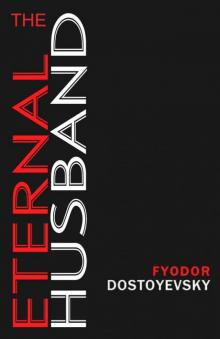 The Eternal Husband
The Eternal Husband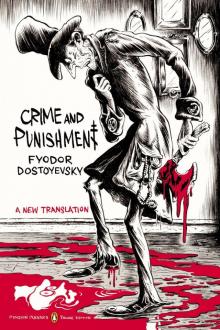 Crime and Punishment
Crime and Punishment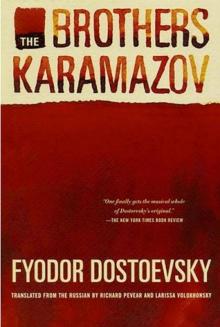 The Brothers Karamazov
The Brothers Karamazov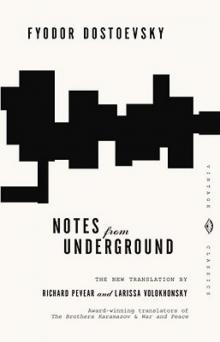 Notes From Underground
Notes From Underground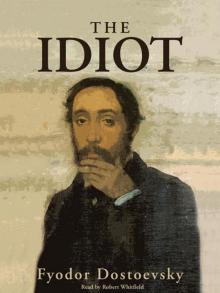 The Idiot
The Idiot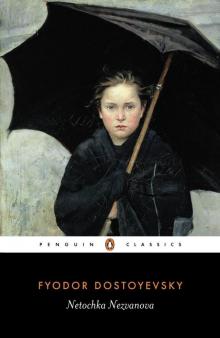 Netochka Nezvanova (Penguin ed.)
Netochka Nezvanova (Penguin ed.)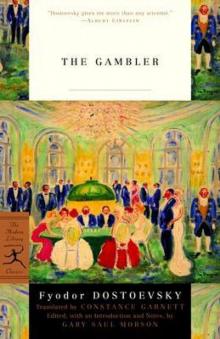 The Gambler
The Gambler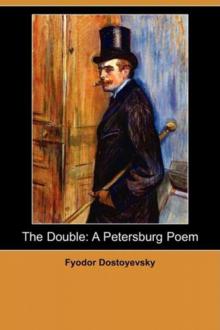 The Double
The Double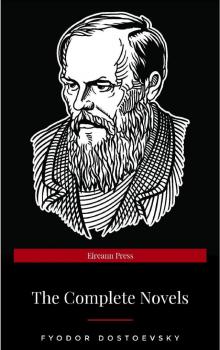 Poor Folk Anthology
Poor Folk Anthology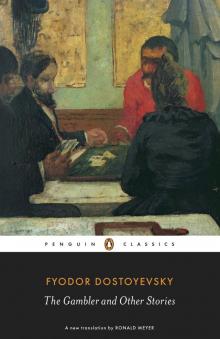 The Gambler and Other Stories (Penguin ed.)
The Gambler and Other Stories (Penguin ed.) Prestuplenie i nakazanie. English
Prestuplenie i nakazanie. English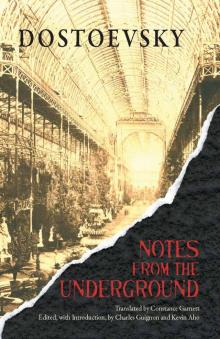 Notes from the Underground
Notes from the Underground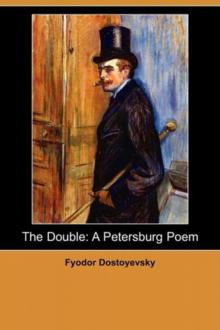 The Double: A Petersburg Poem
The Double: A Petersburg Poem White Nights and Other Stories / The Novels of Fyodor Dostoevsky, Volume X
White Nights and Other Stories / The Novels of Fyodor Dostoevsky, Volume X Complete Works of Fyodor Dostoyevsky
Complete Works of Fyodor Dostoyevsky Poor Folk and Other Stories
Poor Folk and Other Stories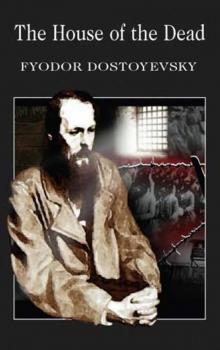 The House of the Dead
The House of the Dead